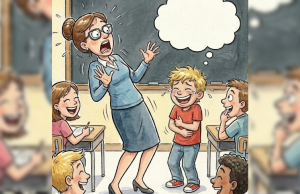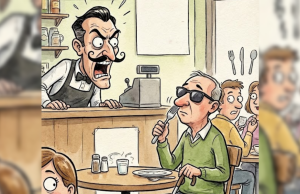
The smell of fried onions floated through the apartment. Lyuda mechanically blended the gravy while glancing at the clock. Valera was assumed to return from work in half an hour, and dinner needed to be served hot—her husband couldn’t stand cold food.
Lately, Lyuda realized that she was cooking like a robot. She did everything in this apartment.
The door slammed earlier than usual. Lyuda flinched, quickly wiped her hands on her apron, and peeked into the hallway.
“Valera, are you home already? Dinner will be ready in fifteen minutes,” she said.
“I’m not alone,” her husband said.
Behind him appeared the imposing figure of his mother.
“Good afternoon, Nadezhda Pavlovna,” Lyuda attempted a smile. “Come in, I’m just cooking.”
“Frying gravy again?”
“How many times must I repeat: the onions should be cooked until they are golden, not charred to black ashes. Otherwise, everything tastes bitter.”
“Come on, Mom, don’t be like that,” Valera plopped into a chair. “My wife cooks just fine. As long as she feeds me, I’m happy.”

“Exactly, ‘happy’ is not enough,” the mother-in-law jumped in.
The phone on the table vibrated. Lyuda reached for it, but Valera was faster.
“It’s from Berezovka,” he said, looking at the screen. “Probably the social services again about your grandmother.”
Lyuda’s heart tightened. Three weeks ago, her grandmother Zina had passed away—the only person who had always supported her.
“Hello,” Lyuda answered.
It was Antonina Sergeyevna, the grandmother’s neighbor, calling.
“Lyudochka, you need to come. We have to process the house documents. And really, take a look at what’s going on. The estate and garden deserve some care—it’s a shame to just let it go.”
“Yes, of course, I’ll come on the weekend,” Lyuda replied.
“Were they calling about the little house again?” Valera asked. “Sell it quickly—to avoid any trouble. Don’t waste money on it.”
“I don’t want to sell it,” Lyuda answered. “It’s a memory of my grandmother.”
“Oh, just don’t start singing about memories now!” her husband reminded. “What memory? It’s a rundown shack on the edge of the village, where there isn’t even gas.”
“But there’s a river nearby,” Lyuda countered. “And an apple orchard. Grandmother was always proud of them.”
Her mother-in-law grunted:

“My goodness, and now you’re saying you plan to live there! In this backwater with no modern conveniences. Really, you’ve gone and found yourself a castle.”
Lyuda took leave from work to resolve the inheritance. She had to commute between the notary, the multifunctional center, and the rural council office in Berezovka.
“Where have you been all day?” he fumed when Lyuda returned exhausted. “My shirts aren’t ironed, and there’s no dinner!”
“Valera, I told you—I’m solving the inheritance,” Lyuda answered wearily. “They only gave me two weeks off at work.”
“Who needs your rundown dump?” her husband wouldn’t let it go. “Sell it to the first passerby and forget it!”
Then, the day Lyuda received the documents verifying her ownership of her grandmother’s house was meant to be happy. She even set up a celebratory dinner and bought a bottle of wine. She wanted to share at least a part of her life with her husband.
That evening, when Valera came back home, Lyuda laid the documents out on the table and proudly said:
“Finally, everything is official. The house is officially mine now.”
But instead of congratulations, her husband hardly gave a skeptical snort:
“Well, at least now you have somewhere to go.”
Lyuda smiled uncertainly:

“What do you mean?”
“That’s all I mean,” Valera shrugged. “It won’t work out for us—there’ll be somewhere to leave. To your little house.”
Later that evening, the mother-in-law maliciously hissed:
“Oh, now you’re a landlady! How many acres is it—fifteen hundred square meters with that decrepit little house?”
“The house isn’t decrepit,” Lyuda began to defend herself. “It’s just that nobody lived there or took care of it for a long time…”
“Come on, what are you saying,” interrupted Valera.
“We’re joking. Your little house will be useful if need be.”
Both of them laughed.
The next day, Nadezhda Pavlovna arrived early in the morning. Lyuda was just getting ready for work when her mother-in-law entered the apartment without knocking.
“I brought you some tomatoes,” the woman announced.
“From the market. None of that tasteless, store-bought stuff.”
“Thank you,” Lyuda replied calmly.
“But we already have tomatoes. I bought them yesterday.”

Nadezhda Pavlovna opened the refrigerator, pulled out a tray of tomatoes, and demonstratively sniffed them.
“What kind of tomatoes are these? Just skins!” the mother-in-law exploded. “Throw them out and take mine.”
“Why throw them out?” Lyuda asked in surprise. “They’re perfectly good. I bought them specially for the salad.”
“Can’t you hear what I’m telling you?” Nadezhda Pavlovna raised her voice. “I said, throw them out!”
At that moment, something inside Lyuda finally destr0yed.
“No, Nadezhda Pavlovna, I’m not going to throw them out. They’re fine. And even if they were bad, I’m the one who should decide what to do with them.”
Her mother-in-law choked in outrage.
“Valera!” she shouted. “Come here and see what your wife is doing!”
Valera emerged from the bedroom.
“What happened?”
“Your wife has no respect!” Nadezhda Pavlovna fumed. “I told her, throw out these tomatoes, and she argues!”
“Lyud—why are you doing this? If Mom says…”
“What if Mom told you to throw out all our furniture because she doesn’t like it? Would you still listen?” Lyuda asked calmly.
“Don’t compare!” Valera exploded. “It’s just tomatoes!”
“You ungrateful girl! I’ve come to you with all my heart, and you… I raised your husband all by myself! Without a father! Can you imagine how hard it was for me?”
“I’m leaving,” Lyuda declared suddenly, feeling an unpredicted clarity in her thoughts.
“I need to be alone.”

Lyuda collected only the essentials: documents, warm clothes, her laptop, and her cherished photo album with childhood pictures. In the end, she decided to take her dog—a little Spitz named Lucky, whom Valera practically ignored.
“Do you really think you’ll be able to survive there?” her husband mockingly asked
“In your little house there isn’t even proper heating.”
“Grandmother was a country woman, used to that life,” Nadezhda Pavlovna interjected.
“And you’re a city girl—soft and pampered. You’ll be back by tomorrow!”
“Go on—go to your rotten little house that you got from your granny!” Valera laughed harshly.
“Goodbye,” she whispered, grasping Lucky’s leash.
Lyuda never came back home—not the next day, nor the next week.
Day by day, the house began to come back to life. Lyuda mopped the floors, cleared out the clutter, and explored her grandmother’s trunk of documents.
With nothing else to do, Lyuda baked a cherry pie. She found enough cherries in the pantry. The young mistress took a photograph of the result and posted it on social media with the caption: “My first pie in grandmother’s house.” The post unpredictedly received numerous responses.
Hence, she decided to create a blog about country life and grandmother’s culinary secrets. She described how to prepare a cottage cheese casserole and, in passing, talked about the snowy apple trees visible through the window. The video quickly attracted views.
Lyuda’s blog continued to grow and famous.

Another six months passed, and as Lyuda was officialy hosting baking masterclasses for guests, a letter came from Valera.
“I’m willing to fix everything I’ve done wrong,” he concluded his letter.
Lyuda did not rush to reply. She thanked Valera for his sincerity but proposed that they meet only as guests—he could stay at a local hotel.
Valera never showed up. Instead, increasingly frequent visits came from Mikhail—the baker from a neighboring district, whom Lyuda had met at a fair and with whom she started filming joint videos. A sturdy man with kind eyes, he brought her new baking molds, helped out in the garden, and eventually became a regular guest in her home.
After a regional television segment featured Lyuda and her blog, Valera reappeared.
“Now I understand my mistakes,” he said.
“My mother controled me too much, and I couldn’t stand up to her. Now everything changes—I’ve rented a separate apartment, and I live on my own.”
“This is for you as a farewell,” she said calmly. “I’m glad you’re looking for your own way, Valera. But our paths have already different.”
The next day, a call from Nadezhda Pavlovna came through.
“You’ve completely grown callous,” her mother-in-law chided. “You ruined everything foolishly! Valera suffered so much, and you didn’t even try to preserve the family!”
She simply put the phone down, added Nadezhda Pavlovna’s number to her blacklist, and disabled notifications.

Two years passed, Lyuda became confident and successfully. She organized the “Handmade” exhibition in the district center. After the event, an elderly woman with neatly styled gray hair approached her.
“We haven’t met,” the woman began. “My name is Irina Petrovna. I’m a neighbor of Nadezhda Pavlovna.”
“I just wanted to express my admiration,” Irina Petrovna smiled. “I’ve known Nadezhda for a long time, and I understand how difficult it is to get along with her. You did the right thing by finding the strength to leave and create a new life.”
That meeting was another proof that she had chosen the right path. And the grandmother’s house, once sh0ckingly called the “cottage,” had now become a symbol of warmth and comfort for anyone looking for refuge and understanding.



















